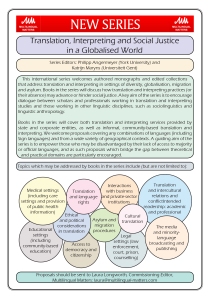This month we published Language Learning and Forced Migration edited by Marte Monsen and Guri Bordal Steien. In this post the editors explain why it’s important to consider forced migration in language learning research.
 When you listen to debates about migration in some European countries, you might get the impression that the rest of the world spend their life waiting for an opportunity to pack their bags and penetrate the European borders. As academics living in Norway, we are used to a discourse where adult language learners are portrayed as people who came to Norway voluntarily and need to meet strict Norwegian language requirements to prevent too many others taking the same journey. Researchers on second language acquisition also tend to view second language learning for adults as voluntary, and of course, many people both move across borders and learn new languages voluntarily for work, for studies or even just for the sake of new experiences.
When you listen to debates about migration in some European countries, you might get the impression that the rest of the world spend their life waiting for an opportunity to pack their bags and penetrate the European borders. As academics living in Norway, we are used to a discourse where adult language learners are portrayed as people who came to Norway voluntarily and need to meet strict Norwegian language requirements to prevent too many others taking the same journey. Researchers on second language acquisition also tend to view second language learning for adults as voluntary, and of course, many people both move across borders and learn new languages voluntarily for work, for studies or even just for the sake of new experiences.
However, many people experience that they are moved across borders with force. In Norway, the immigration policies are strict, so migrants coming to Norway from outside the EU will not be able to settle in Norway unless they are in special need of protection, such as UN resettlement refugees. Adult second language learners in Norway are thus usually forced migrants. In our work, we have met people who have been forced from their homes in the Democratic Republic of the Congo, often by means of cruelty beyond our imagination. They have fled on foot to Uganda, where they have lived a rough life in a sort of limbo, as they know their life in Uganda is only temporary. Under these circumstances, many of them have learned new languages through communicating with people “in the streets”, and many of them have large language repertoires. After years in transit, sometimes decades, they have been resettled in Norway, where few or none of their current language resources are valued. Entering many countries in the Global North entails forced attendance of classes to learn the host language, as is also the case for Norway.
The language courses and language tests that the migrants will come up against in Norway and other European countries are based upon the Common European Framework of Reference for Languages (CEFR). A well-known critique of this framework is that it allows policymakers to easily use language proficiency levels as standards and gatekeepers, while the empirical foundation for these standards is weak, and while the descriptions of language proficiency in CEFR initially was developed to measure foreign language learning by students. Well used concepts within SLA that might further guide the language courses, like Selinker’s theories on interlanguage or various models of motivation or investment in language learning, are also based upon knowledge from students or voluntary migrants. This means that a large number of people that attend language classes in the Global North enter a system that lacks knowledge of their language backgrounds, their needs and their lived experience.
Because of the unique situation of refugees and other forced migrants, we believe we need a research agenda that takes into consideration the experiences of people who have been forced to cross borders. That is what we hope to initiate with our book Language Learning and Forced Migration.
For more information about this book please see our website.
If you found this interesting, you might also like Crossing Borders, Writing Texts, Being Evaluated edited by Anne Golden, Lars Anders Kulbrandstad and Lawrence Jun Zhang.















